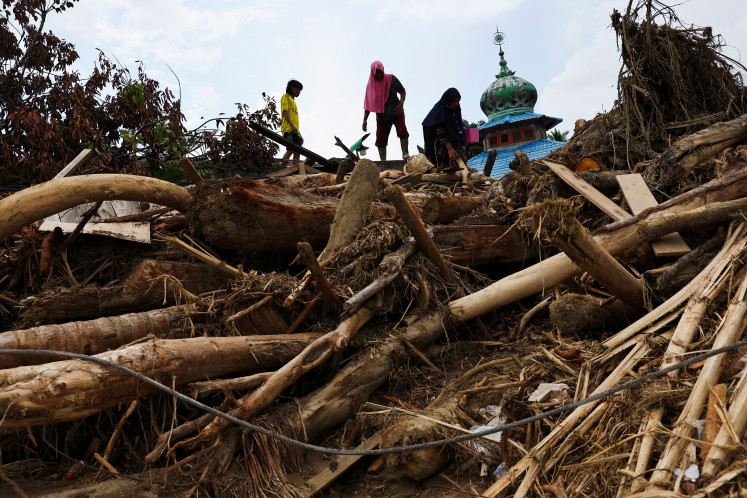Popular Reads
Top Results
Can't find what you're looking for?
View all search resultsPopular Reads
Top Results
Can't find what you're looking for?
View all search resultsExperts: IS expanding its global reach through social media
This June 6, 2013 file photo shows the National Security Administration (NSA) campus in Fort Meade, Md
Change text size
Gift Premium Articles
to Anyone
 This June 6, 2013 file photo shows the National Security Administration (NSA) campus in Fort Meade, Md., where the US Cyber Command is located. US officials tell The Associated Press that the military has launched a newly aggressive campaign of cyberattacks against Islamic State militants. Itâs a targeted effort to erode the groupâs abilities to use social media and the Internet to recruit fighters and inspire followers. Defense Secretary Ash Carter met with commanders at Fort Meade, Maryland, last month, prodding them to ramp up the anti-Islamic State fight on the cyber front. (AP/Patrick Semansky, File) (NSA) campus in Fort Meade, Md., where the US Cyber Command is located. US officials tell The Associated Press that the military has launched a newly aggressive campaign of cyberattacks against Islamic State militants. Itâs a targeted effort to erode the groupâs abilities to use social media and the Internet to recruit fighters and inspire followers. Defense Secretary Ash Carter met with commanders at Fort Meade, Maryland, last month, prodding them to ramp up the anti-Islamic State fight on the cyber front. (AP/Patrick Semansky, File)
This June 6, 2013 file photo shows the National Security Administration (NSA) campus in Fort Meade, Md., where the US Cyber Command is located. US officials tell The Associated Press that the military has launched a newly aggressive campaign of cyberattacks against Islamic State militants. Itâs a targeted effort to erode the groupâs abilities to use social media and the Internet to recruit fighters and inspire followers. Defense Secretary Ash Carter met with commanders at Fort Meade, Maryland, last month, prodding them to ramp up the anti-Islamic State fight on the cyber front. (AP/Patrick Semansky, File) (NSA) campus in Fort Meade, Md., where the US Cyber Command is located. US officials tell The Associated Press that the military has launched a newly aggressive campaign of cyberattacks against Islamic State militants. Itâs a targeted effort to erode the groupâs abilities to use social media and the Internet to recruit fighters and inspire followers. Defense Secretary Ash Carter met with commanders at Fort Meade, Maryland, last month, prodding them to ramp up the anti-Islamic State fight on the cyber front. (AP/Patrick Semansky, File)
T
span class="caption">This June 6, 2013 file photo shows the National Security Administration (NSA) campus in Fort Meade, Md., where the US Cyber Command is located. US officials tell The Associated Press that the military has launched a newly aggressive campaign of cyberattacks against Islamic State militants. It's a targeted effort to erode the group's abilities to use social media and the Internet to recruit fighters and inspire followers. Defense Secretary Ash Carter met with commanders at Fort Meade, Maryland, last month, prodding them to ramp up the anti-Islamic State fight on the cyber front. (AP/Patrick Semansky, File)
Law enforcement officials believe the San Bernardino massacre and a stabbing attack on a California college campus were done by lone wolves inspired by the Islamic State group, and counterterrorism experts say both show how the organization is expanding its reach through social media.
Recruitment videos the extremists post online are often short and flashy. They feature hip-hop music, promising a chance to be part of a global cause and, experts say, most importantly target to a vulnerable audience.
"For somebody searching for meaning and feeling disconnected, that's a very powerful message, and difficult to resist," said John Cohen, a criminal justice professor at Rutgers University and formerly the Department of Homeland Security's counter terrorism coordinator.
That's how Faisal Mohammad, an 18-year-old freshman at the University of California, Merced, appears to have become self-radicalized. The FBI says he visited IS websites for several weeks before he wounded four people in the Nov. 4 knife attack. A campus police officer shot and killed him.
A month later, the gun-wielding husband-and-wife team in San Bernardino shot and killed 14 people and wounded 21 others. Investigators say they were also influenced by the Islamic State group, but not directly connected to it.
"The Internet enables people who aren't necessarily able to function well in a group to claim at least that they're inspired by an ideology," said Jessica Stern, a research professor at the Pardee School for Global Studies at Boston University.
Mohammad had been shunned by a study group at U.C. Merced, where he was a freshman, authorities have said, and Syed Rizwan Farook, 28, launched the San Bernardino attack with his wife against a group of colleagues gathered at a luncheon.
"More must be done to combat jihadists' narrative and their use of the Internet to radicalize, recruit, and fundraise," said Majority Leader Kevin McCarthy, a Republican from Bakersfield. He cited two dozen IS-inspired plots in the United States since 2014.
Lone-wolf attacks carried out in this country are a "Western luxury," said Max Abrahms, a political science professor at Northeastern University. He says it's a sign that there are not large terrorists groups carrying out attacks.
But he agrees that isolated attacks are likely to increase as the Islamic State is increasingly under fire in its strongholds in Iraq and Syria.
"Islamic State is going to continue to decentralize as it gets battered," Abrahms said. "The Internet isn't going away. The group is going to call upon locals to commit attacks." (bbn)









